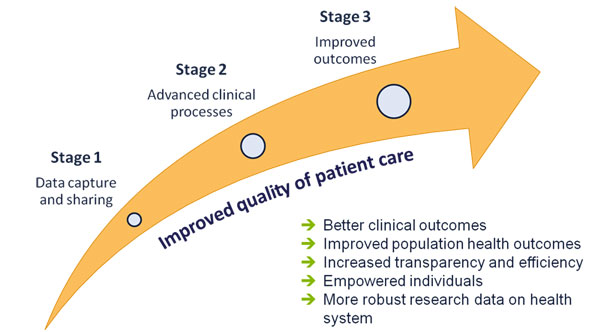Only 8 hospitals have attested for meaningful use stage 2 out of a total of 75 hospitals during the 2014 reporting year, according to the latest data released by CMS. For physicians, only 447 eligible providers have attested for MU Stage 2 out of total 1,497.
Other key EHR Incentive program trends in the report include:
- Over 91% of eligible hospitals have received an EHR incentive payment for either MU or AIU
- 88% of eligible professionals have registered for the Medicare or Medicaid EHR Incentive Programs
- 68% of Medicare and Medicaid EPs have made a financial commitment to implementing an EHR
- Over 380,000 Medicare and Medicaid EPs have received an EHR incentive payment
Meaningful Use Drop Out Rate
Last month, the American Medical Association (AMA) sent a letter to CMS and the ONC challenging the way the meaningful use EHR incentive program is being conducted. The letter stated that unless significant changes are made to MU program and future stages, it would increase the likelihood of:
• More physicians will drop-out of the MU Program;
• Patients will face disruptions and inefficiency in their care, as existing EHRs are unable to
migrate data or facilitate more coordinated care;
• Thousands of physicians will incur financial penalties that hinder future technology purchases
and limit resources dedicated to advancing care; and
• Outcomes-based delivery models, which require data driven approaches, will be jeopardized.
CMS data from 2013 revealed a 20% meaningful use drop out rate. To avoid an increase in the MU drop out rate. AMA recommends:
- Remove the existing program’s all-or-nothing approach and replace it with a 75 percent pass rate
- Allow physicians who meet at least 50 percent of the MU requirements to avoid a financial penalty
- Remove the all-or-nothing approach and replace it with a 75 percent pass rate
- The bar to avoiding a financial penalty should be lowered to 50 percent.
- Remove the concept of menu vs. core
- Streamline and refocus the number of requirements.
- Remove any mandates that are outside the control of physicians.
- Quality reporting programs must be aligned.
- cost should be among the factors taken into consideration when requiring physicians to have to meet a particular MU mandate
- MU mandates should be evidence-based

